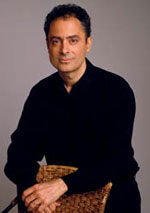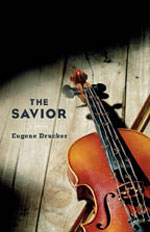|
|
 |
 |
|
BOOKSHELFEugene Drucker ’73A Violinist Turns His Hand to Fiction

Eugene Drucker ’73 PHOTO: ANDREW ECCLES  “First and foremost, I am a musician,” points out violinist Eugene Drucker ’73, a member of the Grammy Award-winning Emerson String Quartet. But the classical musician says that writing his first novel, The Savior: A Novel (Simon & Schuster, $23), gave him “the opportunity to create a story that was very compelling.” Drucker tells the WWII story of Gottfried Keller, a German violinist recruited by the Kommandant of a concentration camp to partake in a lurid experiment involving an audience of 30 camp prisoners. The experiment’s goal, the Kommandant explains, is to “kindle in them the hope to live again” by exposing them to solo violin music — Bach, Ysa˙e, Paganini and Hindemith, as performed by Keller. Involuntarily, Keller takes part in the bored Kommandant’s twisted experiment. The novel becomes a psychological portrait of the violinist as he struggles with the daunting task of moving a damned audience. As he plays, he is haunted by memories of his Jewish girlfriend, Marietta, and Jewish composer friend, Ernst, both of whom left Germany while he remained behind. As the novel progresses, the reader becomes increasingly immersed in Keller’s growth as a musician and his simultaneous struggle with morality. 

The Savior: A Novel by Eugene Drucker ’73  Many of the events in the novel, Drucker says, are based on his father’s life in Germany in the 1930s. A member of the Jewish Kulturbund Orchestra in Frankfurt, Drucker’s father received support from Gentile musician friends during rough times before he immigrated to the United States in 1938. Another part of Drucker’s inspiration for the novel came from his experience in preparing for the Queen Elizabeth International Music Competition in 1976. “I heard that the jury members would be directly in front of the stage, which frightened me,” he says. To get ready for the competition, Drucker performed concerts in hospitals, drug rehabilitation centers and psychiatric wards in and around New York. In his book, he draws on an experience at an alcoholic ward where the patients asked him to perform “Flight of the Bumblebee” and other showpieces not on his program. “They became annoyed that I wouldn’t take their requests. One woman turned her wheelchair around to face the wall while I played, which is what happens to Keller in the beginning of the novel.” Drucker notes that the motivating force to write The Savior also stems from his education at the College, where he intellectually “felt really alive in a way that I have rarely experienced since then.” Drucker grew up in New York and attended the Juilliard Pre-College Division and the High School of Performing Arts (now LaGuardia H.S.) before enrolling in the College at 16. Spurred by a desire to continue his liberal arts studies, he majored in English while studying violin at Juilliard and completed his education at both schools within five years. He recalls among his inspirational teachers Edward Said, who attended one of his concerts at Juilliard in which he was soloist, and literature humanities preceptor Stephen Donadio, now on the faculty at Middlebury College. In 1976, Drucker became a founding member of the Emerson Quartet, which has received critical acclaim worldwide and is the quartet in residence at SUNY Stony Brook. In its upcoming season, the Emerson Quartet plans to perform the chamber works of Brahms at Lincoln Center as well as record works by Bach, Martinu and Janácek on the Deutsche Grammophon label. Drucker also will be an adjunct faculty member at the Bard College Conservatory of Music. Though music is foremost, Drucker is determining what to write next. He should be encouraged by his early reviews: The L.A Times called The Savior “tightly plotted and deeply affecting.” As Drucker sees it, the novel has helped him merge the two aspects of his life he explored while at Columbia and Juilliard. “If I hadn’t gone to Columbia, I wouldn’t have written this book; because of that, I had this strong yearning to finish [the novel]. I otherwise might have had the same interest, but I don’t think it would have been written.” Maryam Parhizkar ’09
|
|
||||||||||||||||||||||||||||